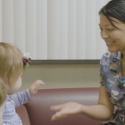Greek task force takes action against sexual violence
Last semester, leaders of the four Greek Governing Council executive boards at the University of Wisconsin–Madison convened a task force to identify and implement recommendations for addressing sexual violence on campus.
Over the next two semesters, they will work with campus offices to roll out changes in six areas, hoping to encourage lasting change in a culture based heavily on traditions.
“It takes 6 percent of a group to change the direction of a crowd,” says Sarah Laudon, a senior in Pi Beta Phi and former vice president for risk management in the Panhellenic Association. “I know that we can’t change everything, but we do represent a good amount of the student body.”
The efforts stemmed in large part from the results of the Association of American Universities Campus Climate Survey on Sexual Assault and Sexual Misconduct, released in September of last year. Among the key findings, a disproportionate amount of sexual misconduct assault took place in off-campus Greek housing.
With strong support from all fraternity and sorority chapters, including members of the Interfraternity Council, the Multicultural Greek Council, the National Pan-Hellenic Council (representing historically African-American fraternities and sororities) and the Panhellenic Association, the task force presented recommendations to Chancellor Rebecca Blank in December.
The six areas of recommendation are as follows:
- Bystander intervention training: helping students understand how to intervene in difficult or high risk situations
- Support members: training individuals in each chapter to act as compassionate listeners and offer information about victim support resources
- Recruitment: emphasizing positive campus-wide values while discouraging potential members seeking riskier activities
- Accountability: amending chapter and council bylaws to reinforce expectations and encourage participation in proactive efforts
- Chapter involvement: sharing responsibility among multiple individuals and increasing the frequency of discussions and support for healthier norms
- Peer-to-peer discussion: communicating with trusted brothers and sisters to address difficult topics in language that is relevant
One major component of the project involves continued collaboration between Greek organizations and University Health Services, along with other campus professionals. Sam Johnson, a violence prevention specialist at UHS, was one of several staffers who advised the students and will help coordinate training.
“We were able to pair the expertise they had about Greek community and Greek Life – what works for them – and our knowledge of prevention practices and programming.” says Johnson.
UHS is scheduled to roll out an evidence-based bystander intervention curriculum for all Greeks, matched by social norming efforts, this fall.
The idea of a “support member” is based on the “Safe Sisters” program at Indiana University. These individuals are trained by health professionals to listen, support and share options available to students on campus and in the community.
Such a program could share information about how to access confidential victim advocacy services as well as information about where to report on campus or to law enforcement. The AAU survey revealed that student victims frequently disclosed to their peers.
Laudon is particularly excited about the ways in which training support members in techniques such as compassionate listening will encourage development of skills that students will be able to use in other arenas.
“We’re trying to reduce sexual assault and harassment, but also build on these things that we can take out into the next stage of our lives,” says Laudon. “Knowing those skills, and how to help people, can help you for the rest of your life, too.”
The group designed several of the recommendations to address preconceptions that many prospective Greek members may have about Greek Life that can contribute to risky behaviors.
“A lot of freshmen will come to college and rush fraternities with certain conceptions about it,” says junior Jimmy Benning, former vice president of the Psi Upsilon fraternity and vice president for risk management in the Interfraternity Council (IFC). “People in Greek Life don’t necessarily tell them that those preconceptions are wrong. A lot of it is that they’re not educated enough.”
Some students indicate less familiarity with what constitutes sexual assault and harassment, or how to intervene in a difficult situation. Amending chapter and council bylaws will establish clearer definitions, expectations and consequences around sexual violence.
In addition, the peer-to-peer components stress the ability to lessen stigma around difficult issues.
“There’s something different when you have someone in your in-group talk to you,” says Benning. “When older members bring it up, it makes it a lot more comfortable for the younger guys to talk about.”
Benning hopes that the peer-to-peer aspects will keep the discussions going on a consistent basis, offering more than just a required session to “check off,” as with some required activities that only take place once or twice a year.
“A lot of that info is good, but you leave, and you’re not really exposed to that again,” he says. “You lose it to short-term memory.”
The recommendations will be implemented over the next two semesters, beginning with bystander intervention training and amending council bylaws this spring. Pilots for other recommendations such as the Safe Sister/Brother program, peer-to-peer discussions and others will take place in a few chapters at first, then expand in the fall.
Laudon and Benning both hope that the Greek organizations can serve as role models – for others on campus, and for Greek Life throughout the Big Ten.
“The reduction in numbers [of incidents] is important,” says Laudon, “but it’s important to change the culture, seeing things change over time.”
Tags: safety, student life



